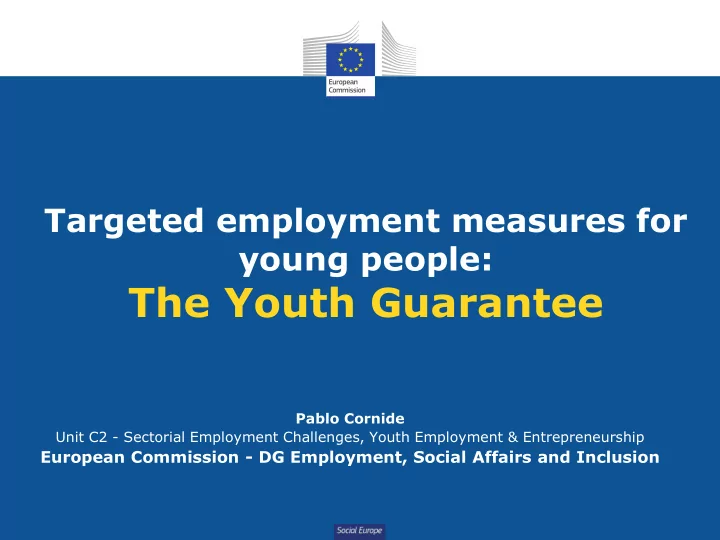

Targeted employment measures for young people: The Youth Guarantee Pablo Cornide Unit C2 - Sectorial Employment Challenges, Youth Employment & Entrepreneurship European Commission - DG Employment, Social Affairs and Inclusion Social Europe
Why a Youth Guarantee? • Macro-economic environment • Young people dropping out of education or work; low skilled youth most at risk of unemployment and exclusion in the longer term • Difficult school-to-work transitions • Transitions more difficult in countries with segmented labour markets Macro-economic instruments Youth Guarantee schemes Increase the supply of high-quality traineeships and apprenticeships Reforms in labour market regulation Labour mobility https://www.youtube.com/watch?v=3IIS9hMUvWU Social Europe
Youth unemployment rates (15-24 years old) for the EU Member States Source: Eurostat, LFS [une_rt_a] Social Europe
Do we still need a Youth Guarantee? • Despite a slight improvement youth unemployment is still very high in the EU (EU YUR more than double the EU UR) + EU YUR masks big differences between countries • Gap between youth unemployment and overall unemployment rates is too wide cyclical factors that disproportionally affect the levels of youth employment and unemployment in MS + also a consequence of structural characteristics of labour markets that the Youth Guarantee strives to change. • In some MS YUR have decreased substantially (in some cases almost by half) from very high levels BUT risk they end up with higher structural levels of youth employment and/or lower youth employment rates than before the crisis Social Europe
A Youth Guarantee Council Recommendation of 22 April 2013. Member States should: ensure that all young people under 25 receive a good-quality offer of employment , continued education , an apprenticeship or a traineeship within four months of becoming unemployed or leaving formal education. Social Europe
Young people under 25 Unemployed or In formal education (incl. continued) who have left formal education or in employment Unemployed Inactive Registration with Youth Guarantee provider For example employment, social, educational services Youth Guarantee preparatory service Drop outs For example: individual case management, personalised guidance, training and mentoring From day one of registration Receive Youth Guarantee Offer Non Within four months of becoming unemployed or leaving education take-ups Non-Subsidised Offer Subsidised Offer YEI, ESF, national funding Employment Employment Continued education Continued education Apprenticeship Apprenticeship Traineeship Traineeship Employment Unemployed Employment Unemployed Further education Inactive Further education Inactive Social Europe
The Youth Guarantee is • an outcome-based approach • a long-term structural reform (including VET/ apprenticeships reform, PES reform…) • about coordinated partnerships (ministries, social partners, youth organisations, etc.) • needs substantial financial and political backing from Member States Social Europe
YG: State of play All Member States have presented comprehensive Youth Guarantee Implementation Plans in-depth structural reforms of training, job-search and education systems to drastically improve the transition from school to work and the employability of young people identify and activate those furthest away from the labour market (NEETs) Social Europe
EU financial support to YG implementation Most important source of EU money to support implementation of the Youth Guarantee is the European Social Fund (ESF) worth around EUR 86 billion for the 2014-2020 period To top-up available EU financial support to the regions where individuals struggle most with youth unemployment and inactivity, the EU has created a dedicated € 6.4 billion Youth Employment Initiative (YEI). regions with levels of youth unemployment above 25% => 20 MS • are eligible YEI money can be used for hiring subsidies, support for young people starting a business, first job experience, traineeships, apprenticeships, further education and training… Social Europe
Social Europe
Thank you for your attention! Social Europe
Recommend
More recommend